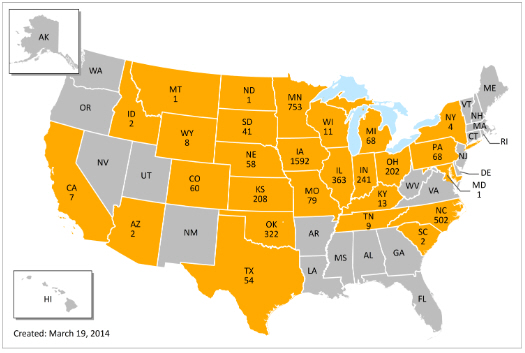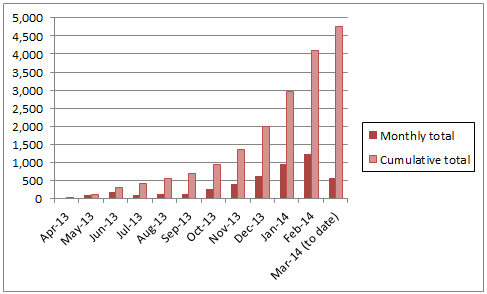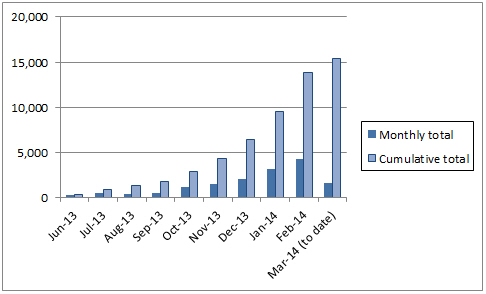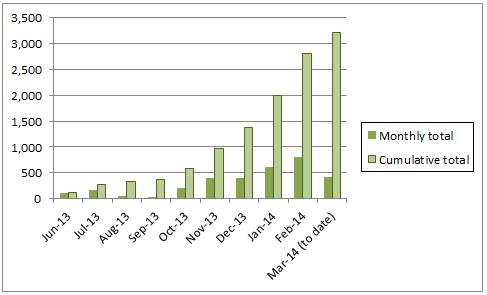



PED Update in US: 27 States Affected
US - The total number of farms that have tested positive for the Porcine Epidemic Diarrhoea (PED) virus now stands at 4,757, writes Jackie Linden.The National Animal Health Laboratory Network (NAHLN) reports reports 296 new cases this week (week ending 15 March 2014). The Service has modified some earlier totals, bringing the grand total of positive accessions to 4,757.
No new states were added, so the number of states reporting at least one confirmed case of PED remains at 27.

Pig Farms Testing Positive for PEDv: 4,757
The total number of pig farm samples (termed 'laboratory biological accessions' in the official report) that have tested positive for the PED virus (PEDv) since April 2013 now stands at 4,757, which is 296 more than the previous week.
For the current month to date, 1,741 farm samples have been tested, of which 578 or 33 per cent tested positive for the PEDv in the latest report for the week of 15 March 2014.
Since testing was fully reported in November 2013, 11,407 farm samples have been tested, of which 28 per cent have tested positive for the PED virus.

(since April 2013; data from NAHLN)
Results by age class
Suckling pigs
For the current month to date, 239 farms have been tested, of which 127 were positive for PEDv.
Since testing was fully reported in November 2013, 1,468 farms have been tested, of which 981 or 44 per cent tested positive for PEDv.
Nursery pigs
For the current month to date, 264 farms have been tested, of which 85 were positive for PEDv.
Since testing was fully reported in November 2013, 1,958 farms have been tested, of which 891 or 34 per cent tested positive for PEDv.
Grower/finisher pigs
For the current month to date, 261 farms have been tested, of which 66 were positive for PEDv.
Since testing was fully reported in November 2013, 2,174 farms have been tested, of which 1,016 or 29 per cent tested positive for PEDv.
Sows and boars
For the current month to date, 138 farms have been tested, of which 48 tested positive for PEDv.
Since testing was fully reported in November 2013, 796 farms have been tested, of which 451 or 30 per cent tested positive for PEDv.
Unknown age class
For the current month to date, 908 farms have been tested, of which 269 tested positive for PEDv.
Since testing was fully reported in November 2013, 5,348 farms have been tested, of which 1,527 or 21 per cent tested positive for PEDv.
Results by state
No new states have reported a first confirmed case of PED in the state this latest report so the total number of states reporting at least one confirmed case of PED remains at 27.
The total number of positive accessions on this report is 4,757 - 296 more than the previous week.
Those states with 50 or more positive tests are: Iowa, 1,592; Minnesota, 753; North Carolina, 502; Illinois, 363; Oklahoma, 322; Indiana, 241; Kansas, 208; Ohio, 202; Missouri, 79; Pennsylvania and Michigan, 68; Colorado, 60; Nebraska, 58 and Texas, 54.
For the most recent week (week of 9 March), Iowa once again leads the 'league table' in the number of new positive results, accounting for 71 of the total of 296 new positive results, followed by Minnesota (52), Illinois (43), Indiana (22) and North Carolina (17).
Individual Pigs Testing Positive for PEDv: 15,395
The total number of individual swine samples (termed 'biological samples' in the official report) since testing began in June 2013 now stands at 15,395, which is 868 more than the previous report.
For the current month to date, 6,121 samples were tested, of which 1,602 or 26 per cent tested positive for PEDv.
Since testing was fully reported in November 2013, 44,985 samples have been tested, of which 24 per cent tested positive for PEDv.

(since June 2013; data from NAHLN)
Environmental Samples Testing Positive for PEDv: 3,224
The total number of environmental samples testing positive since testing began in June 2013 now stands at 3,224, which is 264 more than the previous report.
For the current month to date, 1,530 samples have been tested, of which 423 or 28 per cent tested positive for PEDv.
Since testing was fully reported in November 2013, 10,367 samples have been tested, of which 22 per cent tested positive.
States with positive environmental samples in the latest week (9 March; positive/number of samples tested) are Colorado (14/19), Iowa (66/249), Illinois (3/45), Indiana (2/11), Kansas (11/40), Minnesota (11/77), Missouri (6/9), North Carolina (95/214), Nebraska (6/24), Ohio (1/24), Oklahoma (11/82), South Dakota (7/11), Tennessee (3/3) and unknown (25/46).

(since June 2013; data from NAHLN)
Notes on the report
These data are collated by USDA APHIS VS NVSL National Animal Health Laboratory Network (NAHLN) and cited by the American Association of Swine Veterinarians (AASV) in a report dated 19 March 2014.
Veterinary diagnostic laboratories that have voluntarily reported PEDv testing data to NAHLN include: University of Georgia–Athens, University of Illinois, Iowa State University, Kansas State University, University of Minnesota, Nebraska Veterinary Diagnostic Center, Ohio Department of Agriculture, Purdue University, Michigan State University - Diagnostic Center for Population and Animal Health and South Dakota State University. This data does not include testing conducted at private diagnostic laboratories, at the NVSL, or for research purposes.
Data summaries provided in this report reflect the most current and complete data available at the time the report was prepared, and summaries in this report may differ from those provided in past reports.
Monitoring of PEDv testing started the week of 16 April 2013; April monthly totals include samples tested starting in that week.
USDA NAHLN began collating PEDv testing data on 16 June 2013. Weekly data prior to that date were provided by Iowa State University Diagnostic Laboratory. During the 2013 federal government shutdown, the University of Minnesota diagnostic collected and reported PEDv testing data (weeks of 22 September to 6 October 2013). Data from all sources are compiled in order to be as comprehensive as possible.
In general, a laboratory accession is a set of samples received at the laboratory where the samples were collected by a practitioner on a single premises on a single day. Therefore, each laboratory accession represents a single swine herd and each sample represents an individual animal tested for PEDvV on a given date. Because multiple swine within a herd are often simultaneously infected, analyses commonly use the laboratory accession as the epidemiological unit of interest.
Initially, some testing laboratories only provided data on PEDv-positive accessions and samples. Data on PEDV-negative accessions and samples became available from all laboratories starting November 2013. Therefore, summaries of the 'total number tested' (e.g. number of accessions tested or number of samples tested) were calculated for samples tested on or after 1 November 2013.
Age classes are defined as suckling (up to one month old or still on sow), nursery (one to three months), grower/finisher (three to eight months) and sow/boar (older than eight months).
This report does not currently include results of testing on feed samples.
This report only includes PCR testing data at this time, with addition testing types to be added to the report as information on the performance of new assays becomes available.
The format for this report is currently in transition as stakeholder feedback is incorporated.








